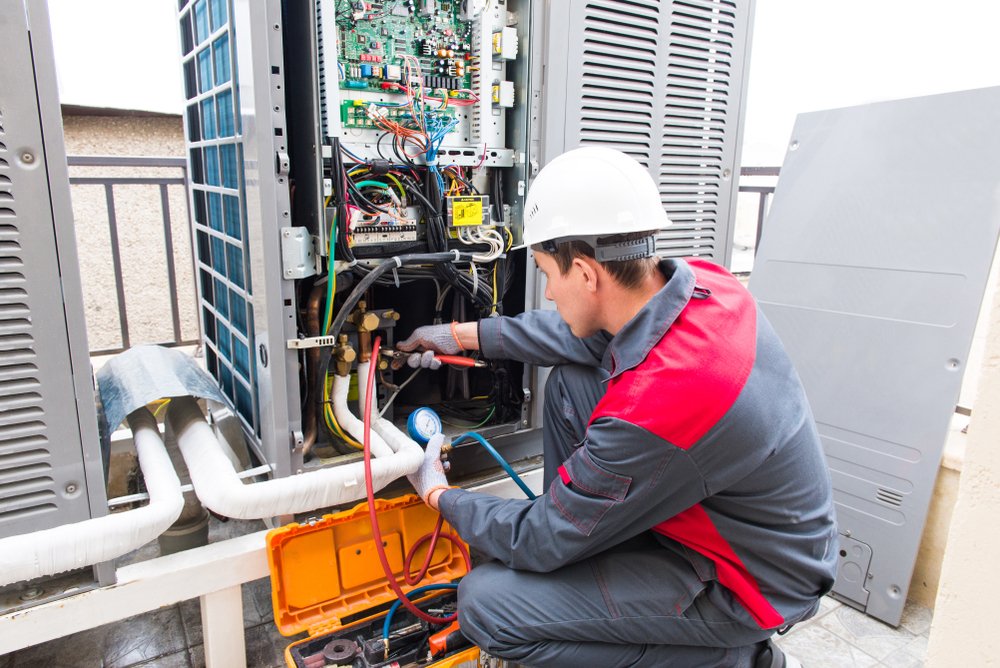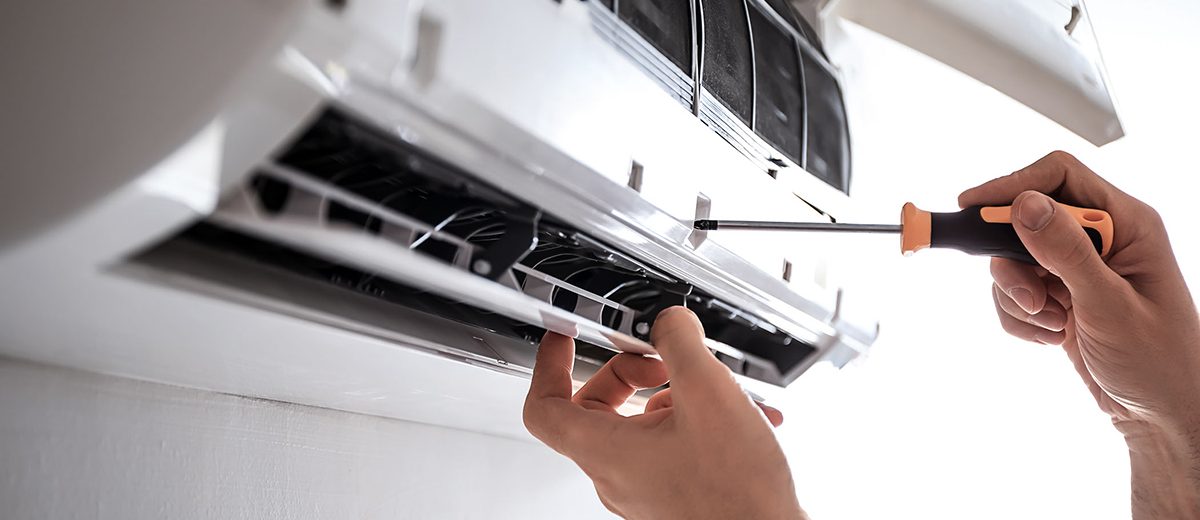Addressing Water Leakages From Your Cooling Unit
When it concerns your cooling unit, addressing water leakages is like placing a bandage on a wound – necessary for peak functioning. Wondering why your a/c is leaking water? Allow's explore the concealed causes behind this typical problem, unwind functional options to repair leaks, and comprehend the significance of prompt fixings.
Remain tuned to reveal the trick to maintaining a cool, leak-free atmosphere in your home.
Trick Takeaways

- Regular maintenance avoids AC water leaks by unclogging drain lines.
- Timely fixings and assessments prolong device life-span and stop mold growth.
- DIY troubleshooting includes examining filters, pumps, and condensate lines.
- Specialist support makes certain proper water drainage and addresses underlying issues properly.
Common Reasons For A/c Water Leaks
One common reason your air conditioning system may be dripping water results from a stopped up condensate drainpipe line. To prevent this issue, regular maintenance is necessary. You can avoid clogs by periodically flushing the drain line with a mixture of bleach and water. This basic maintenance suggestion aids keep the line clear, allowing water to stream freely and decreasing the danger of leaks.
If you notice water merging around your AC unit, it's important to deal with the trouble quickly. ac not cooling Disregarding the problem can cause water damage and mold and mildew development. In many cases, you may require professional aid to unblock the drain line properly. A licensed service technician can inspect your system, clear any clogs, and make sure appropriate drain.
Exactly how to Recognize a Water Leak

If you notice water pooling around your a/c system, a common indicator of a leakage, it is essential to immediately identify the source of the concern. Leak detection is important in preventing more damage to your air conditioning system. Beginning by checking for any kind of visible signs of water leakage, such as pools or trickles around the device. Check the drain line for obstructions or obstructions that may be causing water to back up. In addition, search for any fractures or holes in the condensate frying pan that could be allowing water to escape.
Condensation administration is one more key facet of recognizing a water leak. Make certain the condensate line is properly connected and draining as it should. Often, improper installment or damage to the line can lead to leaks. Examine the insulation around the line also, as any type of deterioration might trigger condensation to form in unexpected areas.
DIY Troubleshooting Tips
Wondering how you can fix water leaks from your a/c system on your own? Right here are some do it yourself troubleshooting tips to assist you attend to the issue efficiently:
 * Inspect the Filter: Start by inspecting and cleansing the air filter. A blocked filter can limit air movement, leading to ice buildup and at some point triggering water leakages.
* Inspect the Filter: Start by inspecting and cleansing the air filter. A blocked filter can limit air movement, leading to ice buildup and at some point triggering water leakages.
Evaluate the Condensate Pump: Make sure that the condensate pump, responsible for getting rid of excess moisture, is functioning appropriately. If it's not working, water may collect and leak.
Look for Blockages: Check for any type of obstructions in the condensate drain line. Particles or algae build-up can impede proper drainage, resulting in leakages.
Examine the Cooling Agent Degrees: Reduced cooling agent levels can trigger the evaporator coil to freeze, causing water leak. If you presume this concern, contact an expert for assistance.
Display the Thermostat Settings: Inaccurate thermostat settings can trigger the device to run longer than necessary, potentially triggering excessive condensation. Readjust the settings to make sure peak efficiency and avoid leakages.
Relevance of Timely Repair Works
Dealing with water leaks from your a/c system immediately is essential to stop additional damages and keep peak performance. Timely repair services provide substantial benefits, consisting of prolonging the life-span of your unit, boosting energy efficiency, and avoiding expensive water damages to your residential or commercial property. Ignoring these leakages can lead to mold and mildew growth, structural degeneration, and potential carcinogen.
To guarantee your air conditioning system operates efficiently, routine upkeep is vital. Straightforward upkeep pointers such as cleansing or replacing air filters, checking for clogged drainpipe lines, and examining the condensate pan can assist protect against water leakages. Furthermore, organizing specialist evaluations a minimum of once a year can catch any type of prospective problems early and prevent them from escalating right into significant issues.
Preventing Future Water Leakages
Curious just how you can proactively stop future water leaks from your a/c unit? Below are some necessary actions to aid you maintain your device and prevent potential problems:

Normal Upkeep Set Up: Establish a regular upkeep routine with a professional HVAC service technician to guarantee your device is correctly inspected and serviced.
Clean the Condensate Drainpipe: Consistently examine and clean up the condensate drainpipe to prevent clogs that can bring about water leaks.
Check Insulation: Inspect the insulation around your a/c unit to make sure it's intact and correctly secured, preventing condensation build-up.
Change Air Filters: On a regular basis change or tidy air filters to prevent dirt and particles from obstructing air flow and triggering leakages.
Screen Water Levels: Keep an eye on the water levels in the condensate pan to spot any kind of unusual increases, showing a prospective issue that requires interest.
Often Asked Questions
Can Water Leaks From an A/c Device Cause Damages to the Surrounding Walls and Floors?
Water leaks from any device can lead to significant damage. Protecting your floor covering is important when dealing with leakages.
Implement safety nets to stay clear of prospective problems. Waterproofing remedies can assist avoid comprehensive wall damages.
Be proactive in resolving leakages to guard your home's structure.
Exist Any Wellness Risks Related To Water Leaks From an A/c Device?
When it concerns wellness implications, water leakages from your air conditioning unit can bring about mold growth, which can trigger allergies and respiratory system concerns. To stop this, guarantee normal maintenance of your unit and immediately address any leakages.
Also, be watchful regarding signs of water damage, as it can endanger your interior air high quality. On a regular basis looking for leakages and resolving them immediately can aid maintain a healthy and balanced living atmosphere.
How Can I Establish if the Water Leak From My AC System Is a Minor Issue or a Major Trouble Requiring Expert Repair?
When reviewing water leaks from your AC unit, you can start with DIY fixing like looking for clogs or leaks in the drain system. If concerns linger, it's smart to ponder a specialist inspection for an extra accurate medical diagnosis.
While fast solutions might supply momentary alleviation, long-term solutions usually require the proficiency of an experienced specialist to stop future troubles and ensure your system's ideal performance.
Is It Feasible for Mold or Mold to Develop as an Outcome of a Water Leak From a Cooling Unit?
Yes, mold avoidance is vital when managing water leakages from your cooling device. Routine maintenance and leakage discovery are vital to avoid mold or mold growth.
Exist Any Type Of Prospective Electrical Hazards That Can Occur From Water Leaks in an Air Conditioning Device?
Prospective hazards from water leaks in a cooling unit can consist of electric security risks. When water enters contact with electrical elements, it can cause brief circuits, electrical fires, or damages to the unit.
It's important to attend to any type of leaks promptly to avoid these dangers. Regular upkeep and inspections can help you identify and resolve any concerns before they intensify right into even more substantial troubles.
Verdict
Do not ignore water leaks from your a/c unit. Addressing them immediately can ensure costly damage and make certain your system runs successfully.
Keep in mind to on a regular basis examine your device, tidy the condensate line, and replace filters as needed. Taking these basic steps can aid you stay clear of potential headaches later on and maintain your home cool and comfy.
Keep aggressive and keep your air conditioner in top shape!